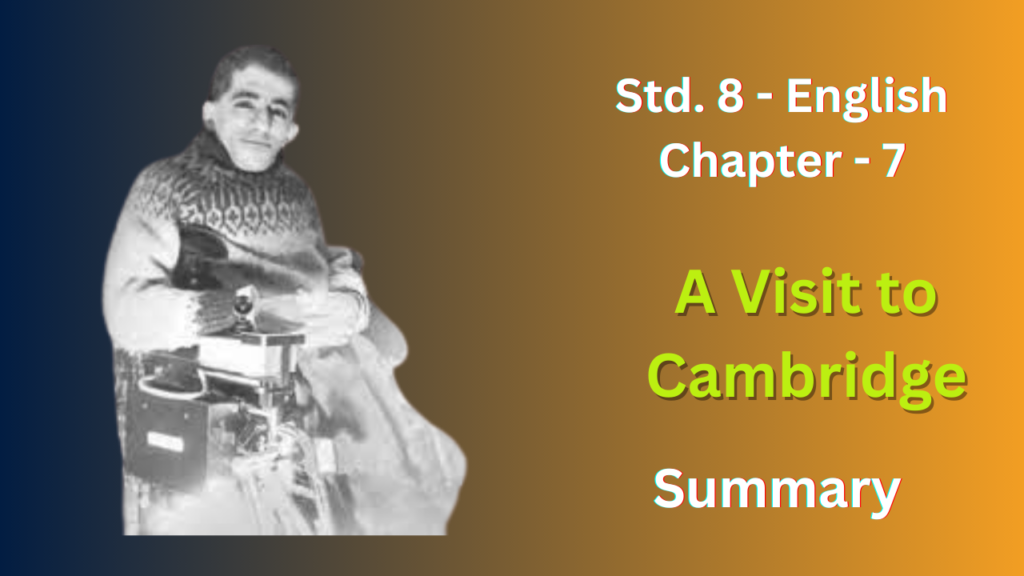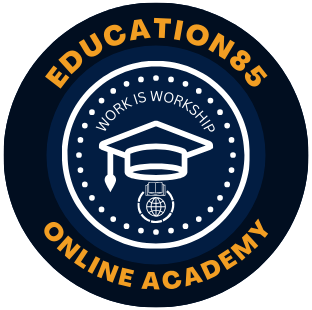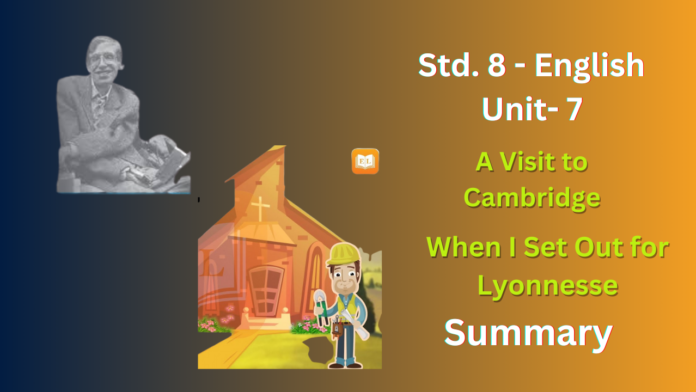NCERT Solutions for Class 8 English Chapter 7
A Visit to Cambridge
In “A Visit to Cambridge,” Firdaus Kanga, a journalist who uses a wheelchair, travels to England with a lifelong dream of visiting Cambridge University. There, he has a scheduled interview with the world-famous physicist Stephen Hawking, another individual with a physical disability.
The chapter dives deeper than just a tourist’s experience. Kanga describes the historic charm of Cambridge, its ancient colleges steeped in academic tradition. He feels a sense of belonging in this environment that values intellectual achievement.
The highlight of the visit is his meeting with Stephen Hawking. Kanga is initially apprehensive, wondering if Hawking, a brilliant scientist confined to a wheelchair and reliant on a speech synthesizer, might find their shared disability a burden in conversation.
However, their discussion quickly transcends physical limitations. They talk openly about the challenges of daily life, the frustration of people’s reactions (pity or patronization), and the constant need to prove themselves. Kanga finds inspiration in Hawking’s unwavering determination to pursue his scientific inquiries despite his condition.
Hawking, in turn, finds humor in how society views people with disabilities. He mentions how some people treat him differently, even offering unnecessary help. Both Kanga and Hawking emphasize the importance of looking beyond the physical and recognizing the potential within.
The interview becomes a powerful exchange. They discuss the concept of “normality” and how societal expectations can be limiting. Kanga describes his own struggles and how he has learned to overcome them. Hawking shares his perspective on the beauty of the universe and the human spirit’s ability to explore it, regardless of physical constraints.
“A Visit to Cambridge” is more than just a travelogue. It’s a story about resilience, the power of the human mind, and the importance of looking beyond physical limitations. Kanga leaves Cambridge inspired by his meeting with Hawking, realizing that disabilities don’t define who you are or what you can achieve.

NCERT Solutions for Class 8 English Chapter 7
Comprehension Check
3. Which is the right sentence?
1. “Cambridge was my metaphor for England.” To the writer
(i) Cambridge was a reputed university in England.
(ii) England was famous for Cambridge.
(iii) Cambridge was the real England.
Ans : (ii) England was famous for Cambridge.
2.The writer phoned Stephen Hawking’s house
(i) From the nearest phone booth.
(ii) From outside a phone booth.
(iii) From inside a phone booth.
Ans: (iii) From inside a phone booth.
3. Every time he spoke to the scientist, the writer felt guilty because
(i) He wasn’t sure what he wanted to ask.
(ii) He forced the scientist to use his voice synthesiser.
(iii) He was face to face with a legend.
Ans : (ii) He forced the scientist to use his voice synthesizer.
4. “I felt a huge relief…in the possibilities of my body.” In the given context, the highlighted words refer to
(i) Shifting in the wheelchair, turning the wrist.
(ii) Standing up, walking.
(iii) Speaking, writing.
Ans : (iii) Speaking, writing.
Working With the Text
Answer the following Questions
1. Question
1. Did the prospect of meeting Stephen Hawking make the writer nervous? If so, why?
Ans : Yes, the writer felt nervous. Meeting a legend like Hawking is daunting, and sharing a disability added a layer of uncertainty about how the interview would unfold.
2. Did he at the same time feel very excited? If so, why?
Ans : Yes, excitement simmered beneath the nerves. A dream visit to Cambridge, topped with meeting Hawking, would be thrilling.
2.Guess the first question put to the scientist by the writer.
Ans : The first question likely probed Hawking’s experience with his disability, perhaps about overcoming challenges or societal perceptions.
3. Stephen Hawking said, “I’ve had no choice.” Does the writer think there was a choice? What was it?
Ans : Yes, the writer suggests Hawking had a choice: to give up or keep pushing forward despite limitations.
4. “I could feel his anguish.” What could be the anguish?
Ans : The anguish likely stemmed from Hawking’s brilliant mind being trapped in a limited body, frustrated by slow communication.
5. What endeared the scientist to the writer so that he said he was looking at one of the most beautiful men in the world?
Ans : Hawking’s honesty and humor about their shared disability disarmed the writer, revealing a strength and inner beauty that transcended physical appearance.
6. Read aloud the description of ‘the beautiful’ man. Which is the most beautiful sentence in the description?
Ans : The most beautiful sentence describing this inner beauty could be:
- “Before you, like a lantern whose walls are worn so thin you glimpse only the light inside, is the incandescence of a man.”
7. 1.If ‘the lantern’ is the man, what would its ‘walls’ be?
Ans : If Stephen Hawking is the “lantern,” the “walls” would be his physical limitations, like his restricted movement.
2. What is housed within the thin walls?
Ans : The thin walls house Hawking’s brilliant mind and spirit.
3. What general conclusion does the writer draw from this comparison?
Ans : True beauty and potential lie within a person, regardless of physical limitations.
8. What is the scientist’s message for the disabled?
Ans : The scientist’s message for the disabled, based on the story, is likely one of resilience and focusing on potential. The story doesn’t provide a direct quote, but Hawking’s own achievements despite limitations speak volumes.
9. Why does the writer refer to the guitar incident? Which idea does it support?
Ans : The writer uses the guitar incident to show, like his struggle with the instrument, focusing on ill-suited pursuits is a waste. It reinforces the idea of playing to your strengths.
10. The writer expresses his great gratitude to Stephen Hawking. What is the gratitude for?
Ans : The writer’s gratitude towards Stephen Hawking is for the inspiration he received.
11.Complete the following sentences taking their appropriate parts from both the boxes below.
- There was his assistant on the line…
- You get fed up with people asking you to be brave….
- There he was ………
- You look at his eyes which can speak, ……..
- It doesn’t do much good to know…
A
- tapping at a little switch in his hand
- and I told him
- that there are people
- as if you have a courage account
- and they are saying something huge and urgent
B
- trying to find the words on his computer.
- I had come in a wheelchair from India.
- on which you are too lazy to draw a cheque.
- smiling with admiration to see you breathing still.
- it is hard to tell what.
Ans :
- There was his assistant on the line and I told him I had come in a wheelchair from India.
- You get fed up with people asking you to be brave, as if you have a courage account on which you are too
lazy to draw a cheque. - There he was tapping at a little switch in his hand, trying to find the words on his computer.
- You look at his eyes which can speak and they are saying something huge and urgent it is hard to tell what.
- It doesn’t do much good to know that there are people smiling with admiration to see you breathing still.
Working With Language
1. Fill in the blanks in the sentences below using the appropriate forms of the words given in the following box.
guide , succeed , chair , travel, pale , draw ,true
- I met a_________ from an antique land.
- I need special_________ in mathematics. I can’t count the number of times I have failed in the subject.
- The guide called Stephen Hawking a worthy__________ to Issac Newton.
- His other problems ________ into insignificance beside this unforeseen mishap.
- The meeting was by the youngest member of the board.
- Some people say “yours________ ’when they informally refer to themselves.
- I wish it had been a________ We would have been spared the noise of celebrations, at least.
Ans :
- I met a guide from an antique land.
- I need special tuition in mathematics. I can’t count the number of times I have failed in the subject.
- The guide called Stephen Hawking a worthy successor to Issac Newton.
- His other problems dwarfed into insignificance beside this unforeseen mishap.
- The meeting was chaired by the youngest member of the board.
- Some people say “yours truly” when they informally refer to themselves.
- I wish it had been a silent night. We would have been spared the noise of celebrations, at least.
2. Look at the following words.
walk stick
Can you create a meaningful phrase using both these words? (It is simple. Add ing to the verb and use it before the noun. Put an article at the beginning.) …a walking stick
Now make six such phrases using the words given in the box.
read / session smile / face revolve / chair
walk / tour dance / doll win / chance
- Ans :
A reading session: This refers to a dedicated period for reading. - A smiling face: This describes a face with a smile.
- A revolving chair: This refers to a chair that can spin or rotate.
- A walking tour: This describes a guided tour where participants walk from place to place.
- A dancing doll: This refers to a doll that is designed to move in a dancing motion.
- A winning chance: This describes an opportunity to succeed or be victorious.
3. Use all or both in the blanks. Tell your partner why you chose one or the other.
- He has two brothers. _________are lawyers.
- More than ten persons called. _________ of them wanted to see you.
- They_________cheered the team.
- _________ her parents are teachers.
- How much have you got? Give me_____ of it.
Ans : (i) Both (ii) All (iii) all (iv) Both (v) all
4. Complete each sentence using the right form of the adjective given in brackets,
- My friend has one of the cars on the road, (fast)
- This is the _________ story I have ever read, (interesting)
- What you are doing now is_________ than what you did yesterday, (easy)
- Ramesh and his wife are both________ (short)
- He arrived________ as usual. Even the chief guest came________than he did. (late, early)
Ans :
- My friend has one of the fastest cars on the road. (superlative adjective)
- This is the most interesting story I have ever read. (superlative adjective)
- What you are doing now is easier than what you did yesterday. (comparative adjective)
- Ramesh and his wife are both short. (simple adjective)
- He arrived late as usual. Even the chief guest came earlier than he did. (simple adjective, comparative adjective
NCERT Solutions for Class 8 English Chapter 7
When I Set Out for Lyonnesse
The poem “When I Set Out for Lyonnesse” by Thomas Hardy tells the story of a young architect who travels to a remote parish (Lyonnesse) to oversee the restoration of a church.
Here’s a breakdown of the key points:
- The Journey: The speaker sets out on a cold evening, traveling a long distance (around a hundred miles) to reach Lyonnesse. The imagery suggests a lonely and potentially challenging journey.
- The Work: The speaker’s task is to supervise the restoration of a church. This suggests a focus on preserving something historical and valuable.
- Transformation: The poem hints at a significant change within the speaker during his time at Lyonnesse. Nobody could have predicted this transformation beforehand.
- Afterward: When the speaker returns, people notice a difference in him. He has a newfound glow in his eyes and a crumpled piece of paper sticking out of his pocket. This paper could symbolize a poem written during his stay, a creative response to his experience.
The poem leaves the reader with a sense of mystery. The exact nature of the transformation and the content of the paper are not explicitly revealed. However, it suggests a journey of self-discovery and a newfound appreciation for the beauty of restoration and creation.

NCERT Solutions for Class 8 English Chapter 7
Working With the Poem
1. In the first stanza, find words that show
(i) that it was very cold.
(ii) that it was late evening.
(iii) that the traveller was alone.
Ans :
(i) Very cold: The poem uses words like “frosty rind” and “froze” to depict the coldness.
(ii) Late evening: While not directly mentioned, the coldness and mention of “stars” stepping out suggest it was nighttime or late evening.
(iii) Traveller alone: There’s no mention of anyone accompanying the speaker. Phrases like “I set out” and “the shrubs and trees” imply a solitary journey.
2. (i) Something happened at Lyonnesse. It was
(a) improbable.
(b) impossible.
(c) unforeseeable.
Ans : (c) unforeseeable.
FAQ’s
What is “A Visit to Cambridge” about in Class 8 English Chapter 7?
“A Visit to Cambridge” is about the author’s visit to Cambridge University and his meeting with the renowned physicist Stephen Hawking. It explores themes of inspiration, perseverance, and the impact of physical limitations on one’s life.
What is the main theme of “When I Set Out for Lyonnesse” in Class 8 English Chapter 7?
The main theme of “When I Set Out for Lyonnesse” is the transformative power of travel and adventure, and how new experiences can change a person’s perspective and life.
How does Stephen Hawking inspire the author in “A Visit to Cambridge” from Class 8 English Chapter 7?
Stephen Hawking inspires the author through his extraordinary achievements despite his severe physical limitations. Hawking’s positive outlook and remarkable intellect demonstrate the power of determination and resilience.
What literary devices are used in “When I Set Out for Lyonnesse” to convey its message in Class 8 English Chapter 7?
“When I Set Out for Lyonnesse” uses imagery, metaphors, and a reflective tone to convey the sense of wonder and transformation experienced by the traveler.
How does the setting of Cambridge contribute to the story “A Visit to Cambridge” in Class 8 English Chapter 7?
The setting of Cambridge, with its rich academic history and association with great minds, serves as a backdrop that highlights the significance of the author’s meeting with Stephen Hawking and underscores the theme of intellectual achievement.
How does “A Visit to Cambridge” depict the theme of overcoming adversity in Class 8 English Chapter 7?
The story depicts overcoming adversity through the life of Stephen Hawking, who, despite his debilitating condition, achieved great success and became an inspiration for many. It shows how intellectual prowess and determination can triumph over physical challenges.


